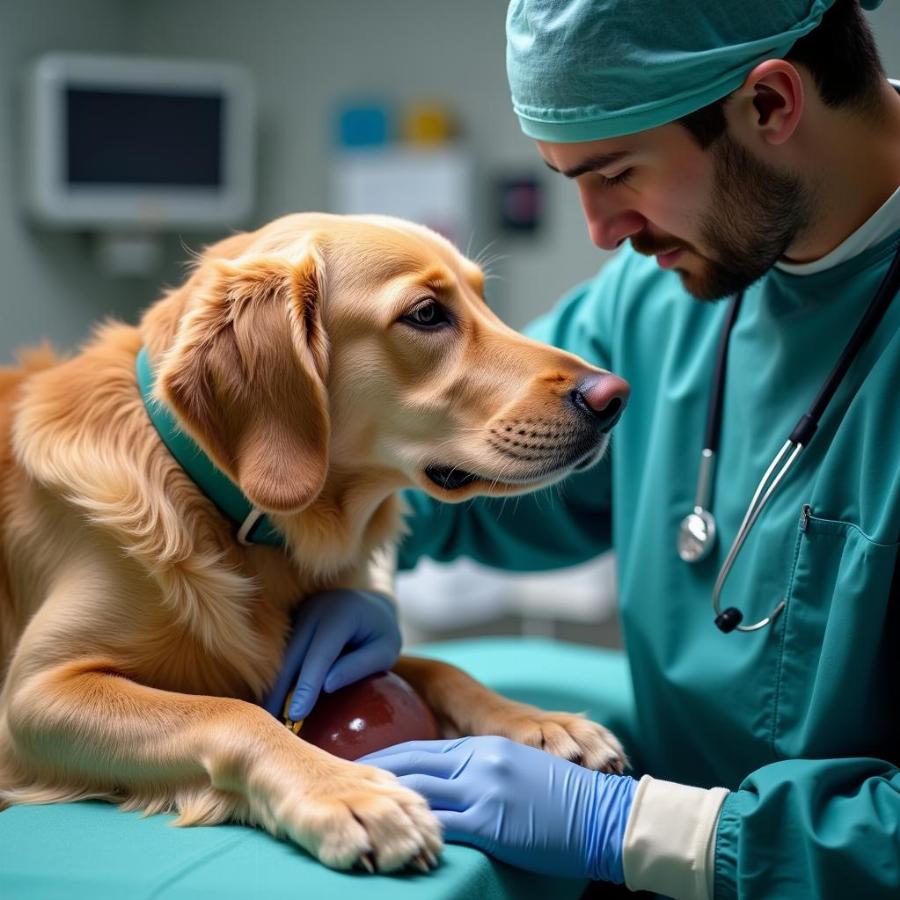Thyroid neoplasia, or thyroid cancer, is a serious health concern in dogs. This comprehensive guide explores the ins and outs of this condition, from understanding the causes and symptoms to discussing diagnosis, treatment options, and essential care tips for affected dogs.
Understanding Thyroid Neoplasia
The thyroid gland, a small butterfly-shaped organ located in the neck, plays a vital role in regulating metabolism by producing hormones. Thyroid neoplasia occurs when abnormal cells in the thyroid gland multiply uncontrollably, forming tumors. These tumors can be benign (non-cancerous) or malignant (cancerous), with the latter having the potential to spread to other parts of the body.
Causes and Risk Factors
The exact causes of thyroid neoplasia in dogs remain largely unknown. However, certain factors may increase the risk, including:
- Breed predisposition: Certain breeds, such as Golden Retrievers, Beagles, and Boxers, are more prone to developing thyroid tumors.
- Age: Older dogs are at a higher risk, with most cases diagnosed in dogs over six years old.
- Environmental factors: Exposure to radiation and certain chemicals may play a role.
Recognizing the Signs: Symptoms to Watch Out For
Early detection of thyroid neoplasia is crucial for successful treatment. Be aware of the following symptoms:
- Swelling in the neck region: A noticeable lump or enlargement in the neck, which may or may not be painful.
- Difficulty swallowing: Tumors can press against the esophagus, making it difficult for dogs to swallow food and water.
- Changes in appetite and weight: Increased or decreased appetite, often accompanied by weight loss.
- Respiratory problems: Difficulty breathing, coughing, or wheezing due to tumor pressure on the trachea.
- Lethargy and weakness: General fatigue and decreased activity levels.
Diagnosis: Confirming Thyroid Neoplasia
If you observe any of the aforementioned symptoms in your dog, consult a veterinarian promptly. They will conduct a thorough physical examination and recommend further tests to confirm the diagnosis, such as:
- Blood tests: To assess thyroid hormone levels and rule out other conditions.
- Fine-needle aspiration (FNA): A minimally invasive procedure to collect a sample of cells from the tumor for microscopic examination.
- Imaging tests: X-rays, ultrasound, or CT scans to determine the size, location, and extent of the tumor.
Treatment Options: Tailoring the Approach
Treatment for thyroid neoplasia in dogs depends on several factors, including the tumor’s size, location, type (benign or malignant), and the overall health of the dog. Common treatment options include:
- Surgery: Surgical removal of the tumor is often the preferred option for localized tumors.
- Radiation therapy: Used to shrink tumors and control their growth, especially for tumors that cannot be surgically removed.
- Chemotherapy: Less common for thyroid tumors in dogs but may be used in conjunction with other treatments.
- Radioactive iodine therapy: A specialized treatment that uses radioactive iodine to target and destroy thyroid cancer cells.
 Thyroid Neoplasia Surgery in Dogs
Thyroid Neoplasia Surgery in Dogs
Living with Thyroid Neoplasia: Care and Support
Following diagnosis and treatment, providing supportive care is essential for improving your dog’s quality of life. This includes:
- Medication: Your veterinarian may prescribe medications to manage thyroid hormone levels and address any underlying conditions.
- Dietary adjustments: A balanced and nutritious diet tailored to your dog’s specific needs.
- Regular monitoring: Frequent check-ups and blood tests to monitor tumor response to treatment and manage any potential side effects.
Frequently Asked Questions
What is the prognosis for dogs with thyroid neoplasia?
The prognosis varies depending on factors like tumor type, stage, and overall health. Early detection and treatment generally lead to better outcomes.
Can thyroid neoplasia be prevented?
While completely preventing it might not be possible, regular veterinary check-ups, a healthy lifestyle, and minimizing exposure to potential risk factors can help.
Are there any natural remedies for thyroid neoplasia in dogs?
While some natural supplements might support overall health, it’s crucial to consult with your veterinarian before administering any alternative treatments.
Can thyroid tumors in dogs affect humans?
No, thyroid neoplasia in dogs is not contagious and cannot be transmitted to humans.
What should I feed my dog after thyroid surgery?
Your veterinarian will recommend a suitable diet, often a soft and easily digestible food, in the initial recovery period.
Need More Information?
For more information on canine health and specific advice on caring for a dog with thyroid neoplasia, contact Beaut Dogs at [email protected]. We’re here to answer your questions and provide expert guidance on all aspects of dog ownership.
Beaut Dogs is your one-stop resource for reliable, insightful, and in-depth information about the world of dogs. We offer a wealth of knowledge on breed characteristics, behavior, and the specific needs of various dog breeds, from common to rare and exotic.
Visit https://beautdogs.com today to delve into the fascinating world of dogs and discover how to provide them with the best possible care!